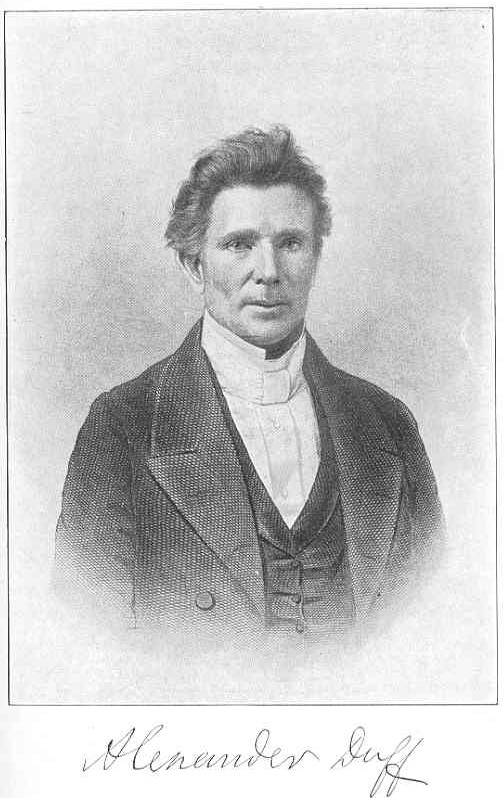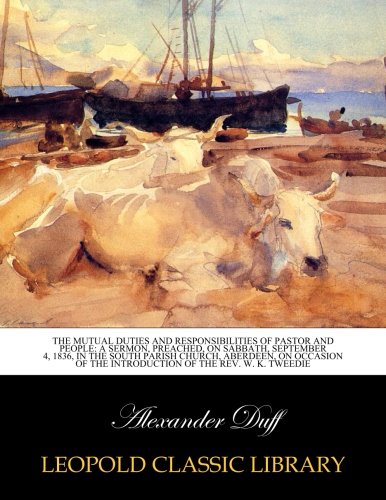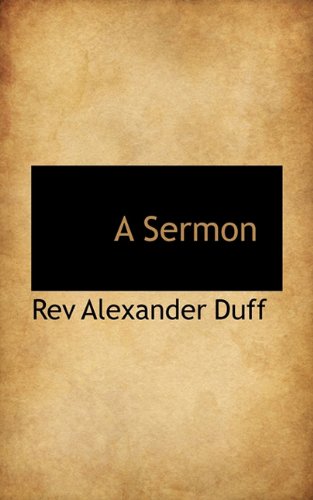Background
Alexander Duff was born in Moulin on April 25, 1806, into a pious family.


(Leopold Classic Library is delighted to publish this clas...)
Leopold Classic Library is delighted to publish this classic book as part of our extensive collection. As part of our on-going commitment to delivering value to the reader, we have also provided you with a link to a website, where you may download a digital version of this work for free. Many of the books in our collection have been out of print for decades, and therefore have not been accessible to the general public. Whilst the books in this collection have not been hand curated, an aim of our publishing program is to facilitate rapid access to this vast reservoir of literature. As a result of this book being first published many decades ago, it may have occasional imperfections. These imperfections may include poor picture quality, blurred or missing text. While some of these imperfections may have appeared in the original work, others may have resulted from the scanning process that has been applied. However, our view is that this is a significant literary work, which deserves to be brought back into print after many decades. While some publishers have applied optical character recognition (OCR), this approach has its own drawbacks, which include formatting errors, misspelt words, or the presence of inappropriate characters. Our philosophy has been guided by a desire to provide the reader with an experience that is as close as possible to ownership of the original work. We hope that you will enjoy this wonderful classic book, and that the occasional imperfection that it might contain will not detract from the experience.
http://www.amazon.com/gp/product/B00XDAGQUW/?tag=2022091-20

(This is a pre-1923 historical reproduction that was curat...)
This is a pre-1923 historical reproduction that was curated for quality. Quality assurance was conducted on each of these books in an attempt to remove books with imperfections introduced by the digitization process. Though we have made best efforts - the books may have occasional errors that do not impede the reading experience. We believe this work is culturally important and have elected to bring the book back into print as part of our continuing commitment to the preservation of printed works worldwide.
http://www.amazon.com/gp/product/1117445461/?tag=2022091-20
Alexander Duff was born in Moulin on April 25, 1806, into a pious family.
He was a brilliant student at St. Andrews University.
Duff visited the United States, where what is now New York University gave him the degree of L. L. D. ; he was already D. D. of the University of Aberdeen.
He was ordained in 1829 and immediately volunteered for missionary service in India. The first foreign missionary of the Church of Scotland, Duff stayed in India until 1863, although his term of service was twice interrupted by long furloughs (1834-1839 and 1850-1855) necessitated by overwork and ill health. During his stays in Scotland, he organized the home base and tried to lay a firm foundation for the work overseas.
Without minimizing the vital importance of a whole network of vernacular primary schools, he focused his attention on higher education in English. When the time came to present the Gospel to the Indian people, Duff chose to work with the upper caste (Brahmin) because he planned for the creation of an Indian Christian elite who would be well versed in Eastern philosophy, Western science, and the Christian faith. Eventually a small group of high quality was expected to become the source of the evangelization of the Indian subcontinent. Duff called this the "downward filter theory. " It was also intended to be one of the creative forces toward the modernization of Indian community life. Duff had the support of the best-known early Indian reformer, Raja Ram Mohun Roy, and was influential in the educational reforms of the British colonial government (1833 and 1854).
As a missionary, Duff hoped that this new style of education might "undermine" Hindu society. His method did not produce large numbers of converts, but the 33 who were converted during his work in India became founders of outstanding Christian families. Also as a result of his work, a number of Protestant colleges were founded in India.
After returning to Scotland, Duff continued to work out "a grand strategy of the Kingdom of God. " He called for the establishment of chairs of missions in theological schools and in 1867 became the first professor of missions in a Protestant institution (New College, Edinburgh). He also planned a training institute for missionaries and a scientific journal for dealing with all aspects of the Christian world task.
He died on February 12, 1878, having won wide acclaim for his work.
Rev Alexander Duff played a large part in the development of higher education.
He was the first overseas missionary of the Church of Scotland to India. On 13 July 1830 he founded the General Assembly's Institution in Calcutta, now known as the Scottish Church College. He also played a part in establishing the University of Calcutta.
(Leopold Classic Library is delighted to publish this clas...)
(This is a pre-1923 historical reproduction that was curat...)
Duff was firmly convinced that education was the key to responsible missionary work and nation building. For him, non-Christian religion was, before anything else, a matter of ignorance.
The top-down theory of education described above typifies Duff’s evangelical elitism, one of the main elements of his legacy in the subcontinent. Duff seems to have believed that there was a direct relationship between education and missionary work. Not only was the education of the Indian people critical to his goal of dispelling "Hindu ignorance" but it was in fact the duty of evangelicals to modernize and instruct Indian society using Western ideals and texts. While Duff was a highly skilled scholar who was devoted to India, his evangelist ideals and western prejudice may have influenced his students in ways that he did not anticipate. Instead of initiating a mass conversion to Christianity he may have instead provided another catalyst for Hindu reform movements.
Duff hoped that through a western education in a time of enlightenment, Indians would be able to see the flaws in their religion and be compelled to convert to Christianity, but he did not consider the resilience of the Hindu religion and his efforts proved to be fairly unsuccessful on the broader scale. Educations of the Christian bible was accepted by Hindus because they were confident in their own religion and were not worried that their children would lose their faith. Hinduism was not only a religion but a culture, and the occupation of the British and their ideas was not drastic enough to change this. Because Alexander Duff was regarded well, his character served as a model to his students and friends and his teaching did eventually lead to some reformist movements within Hinduism. In fact, Duff’s work led to the acceptance of more Indians into public official positions in government. This experience was critical to the transitional Indian government after Independence in 1947.
Quotations:
"I will lay my bones by the Ganges that India might know there is one who cares. ”""
“The church which ceases to be evangelistic will soon cease to be evangelical. ”
He married Ann Scott Drysdale.
